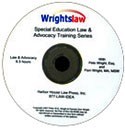Pat Howey says parents need to understand that the law gives them power to use in educational decisions for their children. Parents should not be afraid to use their power.
But, there are better ways to obtain positive results than to roar through IEP meetings in a Mack Truck. Here are Pat's newest tips for effective, successful advocates.
1. Good advocates facilitate the IEP process.
Advocates must set an example for the entire IEP Team. They must be a role model of behavior for the parent. Challenging school experts, demeaning school staff, or being inconsiderate or impolite, will not advance a child’s cause. Your goal is to get better school services for a child. Good advocates ask questions and make valuable suggestions to advocate for a child. It is okay to disagree. It is not okay to put down or verbally attack someone.
2. Good advocates know the child and understand the disability.
Do your homework before you attempt to advocate for a child. Research the child’s disability. Be ready with ideas about instructional methods that are research-based and peer-reviewed. Meet the child and the family in the home environment. Put off making recommendations until you fully understand how the child’s disability affects his or her life and education.
3. Good advocates try to reduce existing barriers between the parent and the school.
Your goal is to bring the school and the parent closer to agreement. Good advocates explain to parents that negotiation is part of the IEP Team process – and a part of life! Pouring gasoline on a fire ensures that everyone gets burned and does not improve the child’s lot.
4. Good advocates are willing to admit mistakes and to apologize.
No one is perfect. We all make mistakes. Good advocates are not afraid to say they are sorry when they make a mistake. They may even write a note to everyone involved, apologizing and asking for forgiveness.
5. Good advocates hone their listening skills to a fine edge.
You must learn to listen to everything that others say. Sometimes, what others do not say is most important. If you are not listening, you may not hear what others say and what they do not say. Good advocates repeat and paraphrase what they have heard to avoid misunderstandings. They ask others to verify that they understood correctly. Good advocates ask follow-up questions. They do not interrupt even when they are faced with rudeness and discourtesy.
6. Good advocates learn the art of negotiation.
Remember the old saying, “You catch more flies with honey than you do with vinegar?” Learning to negotiate is not a sign of weakness or that the parent’s position is not valid. Negotiation is an art that good advocates polish to a fine finish. Successful negotiations allow everyone to come out of the IEP Team Meeting feeling like winners. Brice Palmer, noted advocate from Vermont, says it best: “Good advocates learn to develop a language of persuasion rather than a language of positional combat."
7. Good advocates understand special and general education law and the interrelationship between these and other laws.
The law is not a static entity. It changes every day through court decisions and other types of clarifications. Good advocates review special education law often. They know that answers to frequently asked special education questions may be found in other unrelated laws. For example, Department of Agriculture regulations address special dietary requirements for children. A State’s Department of Health regulations may address classroom size, lighting, and window light. General education law may provide insight into class size and case load issues. The U.S. Justice Department provides guidance on bullying and harassment. Good advocates understand that school policies often omit the special needs of students with disabilities. School emergency plans may not address the needs of children in wheelchairs or children who are deaf or blind. Good advocates learn to research many different laws.
8. Good advocates know that understanding the law is different from quoting the law.
Good advocates know the law but they understand that it is often ineffective and counterproductive to quote it. Pete Wright once said, “[A] parent should never quote law, even if they are an atty, it simply polarizes relationships, instead seek "help" in better understanding something best left to rocket scientists and lawyers. -- Pete Wright Deltaville, VA USA - Tuesday, March 02, 1999 at 20:55:35 (EST).
9. Good advocates understand the importance of ethical behavior in their practice.
There is no Code of Ethics or Professional Responsibility for special education advocates. Advocates have nothing to look to for guidance and there is no governing body to oversee their practice. There are no penalties for advocates who act unprofessionally or unethically. This does not suggest that advocates should disregard ethics and engage in irresponsible behavior. Good advocates understand that the professional respect of the IEP Team is a key to successfully assisting parents achieve an appropriate education for their child.
10. Good advocates treat others the way they would like to be treated.
No one likes surprises. Members of IEP Teams do not respect or trust advocates who drop bombshells. Taking the team by surprise is likely to backfire, especially if the team “captain” is a gatekeeper or is determined to be the one who runs the show. Making the IEP Team Meeting a war of wits does not benefit the child nor does it facilitate the process for the parents.
Printer friendly copy of Pat's newest tips article, 10 Tips for Good Advocates. |







